Community Development: Traditional Indigenous Games and the Curriculum
VerifiedAdded on 2023/06/09
|6
|1355
|380
Essay
AI Summary
This essay explores the innovative approach of using traditional Indigenous games, specifically Yulunga, to foster community development within Australian Indigenous communities. It highlights how these games, integrated into the school curriculum, promote cultural awareness, capacity building, and collaboration among students. The essay discusses the benefits of Yulunga games in aligning with community development principles such as inclusiveness, equity, and responsiveness. It also acknowledges the challenges associated with implementing these games, including the need for cultural sensitivity and obtaining permission from traditional owners. Ultimately, the essay concludes that the integration of Yulunga games contributes significantly to the enhancement of Indigenous community development by promoting Indigenous culture and providing opportunities for students to learn and appreciate Indigenous traditions.
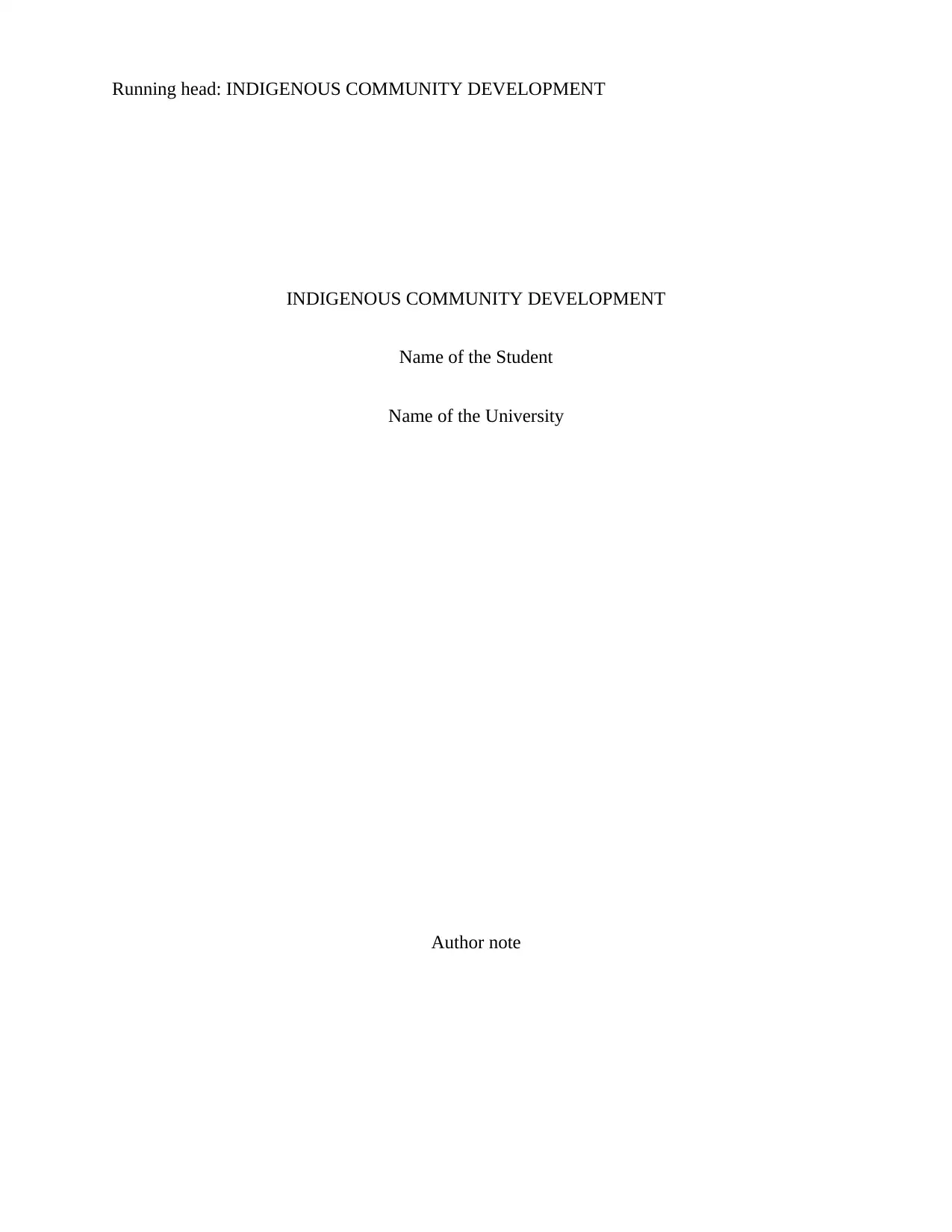
Running head: INDIGENOUS COMMUNITY DEVELOPMENT
INDIGENOUS COMMUNITY DEVELOPMENT
Name of the Student
Name of the University
Author note
INDIGENOUS COMMUNITY DEVELOPMENT
Name of the Student
Name of the University
Author note
Paraphrase This Document
Need a fresh take? Get an instant paraphrase of this document with our AI Paraphraser
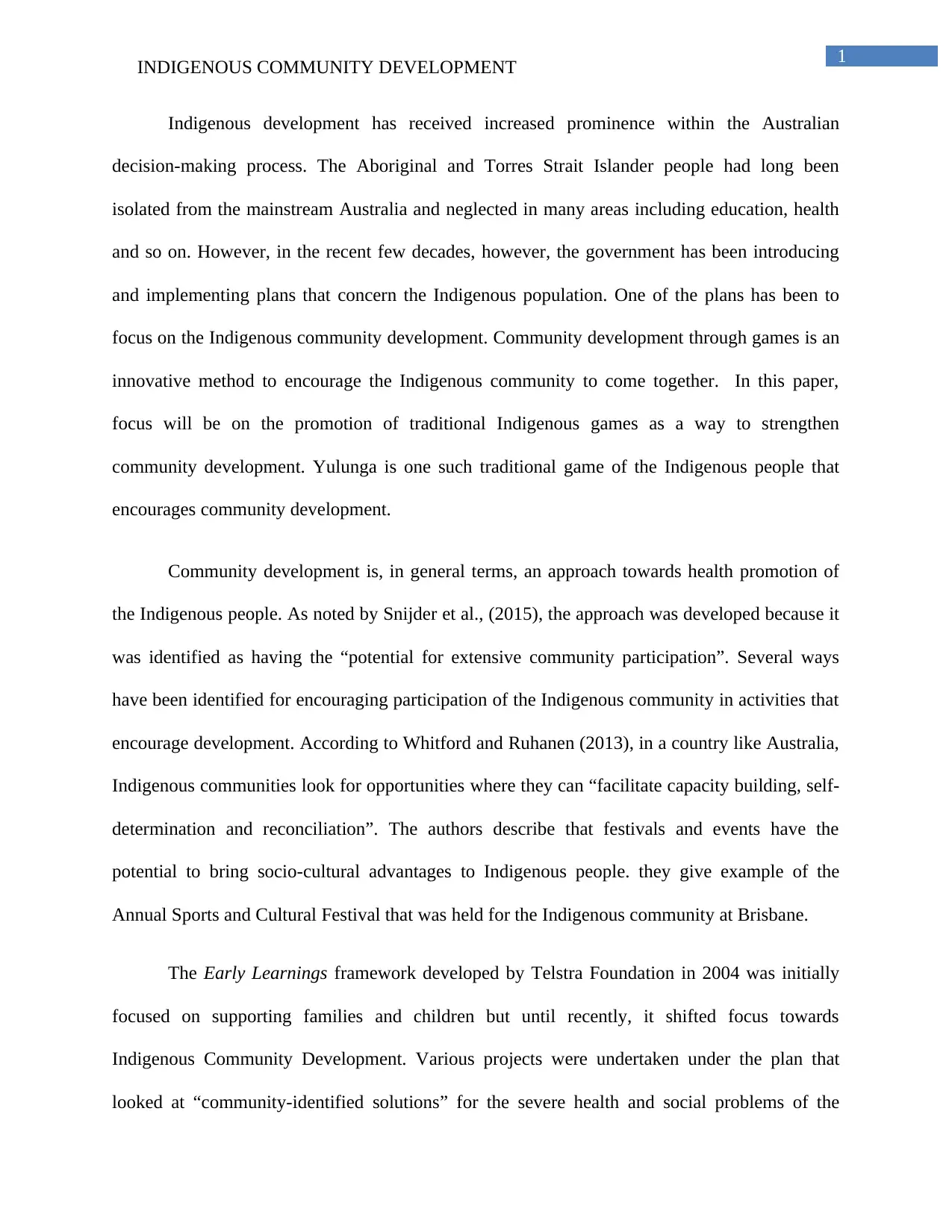
1
INDIGENOUS COMMUNITY DEVELOPMENT
Indigenous development has received increased prominence within the Australian
decision-making process. The Aboriginal and Torres Strait Islander people had long been
isolated from the mainstream Australia and neglected in many areas including education, health
and so on. However, in the recent few decades, however, the government has been introducing
and implementing plans that concern the Indigenous population. One of the plans has been to
focus on the Indigenous community development. Community development through games is an
innovative method to encourage the Indigenous community to come together. In this paper,
focus will be on the promotion of traditional Indigenous games as a way to strengthen
community development. Yulunga is one such traditional game of the Indigenous people that
encourages community development.
Community development is, in general terms, an approach towards health promotion of
the Indigenous people. As noted by Snijder et al., (2015), the approach was developed because it
was identified as having the “potential for extensive community participation”. Several ways
have been identified for encouraging participation of the Indigenous community in activities that
encourage development. According to Whitford and Ruhanen (2013), in a country like Australia,
Indigenous communities look for opportunities where they can “facilitate capacity building, self-
determination and reconciliation”. The authors describe that festivals and events have the
potential to bring socio-cultural advantages to Indigenous people. they give example of the
Annual Sports and Cultural Festival that was held for the Indigenous community at Brisbane.
The Early Learnings framework developed by Telstra Foundation in 2004 was initially
focused on supporting families and children but until recently, it shifted focus towards
Indigenous Community Development. Various projects were undertaken under the plan that
looked at “community-identified solutions” for the severe health and social problems of the
INDIGENOUS COMMUNITY DEVELOPMENT
Indigenous development has received increased prominence within the Australian
decision-making process. The Aboriginal and Torres Strait Islander people had long been
isolated from the mainstream Australia and neglected in many areas including education, health
and so on. However, in the recent few decades, however, the government has been introducing
and implementing plans that concern the Indigenous population. One of the plans has been to
focus on the Indigenous community development. Community development through games is an
innovative method to encourage the Indigenous community to come together. In this paper,
focus will be on the promotion of traditional Indigenous games as a way to strengthen
community development. Yulunga is one such traditional game of the Indigenous people that
encourages community development.
Community development is, in general terms, an approach towards health promotion of
the Indigenous people. As noted by Snijder et al., (2015), the approach was developed because it
was identified as having the “potential for extensive community participation”. Several ways
have been identified for encouraging participation of the Indigenous community in activities that
encourage development. According to Whitford and Ruhanen (2013), in a country like Australia,
Indigenous communities look for opportunities where they can “facilitate capacity building, self-
determination and reconciliation”. The authors describe that festivals and events have the
potential to bring socio-cultural advantages to Indigenous people. they give example of the
Annual Sports and Cultural Festival that was held for the Indigenous community at Brisbane.
The Early Learnings framework developed by Telstra Foundation in 2004 was initially
focused on supporting families and children but until recently, it shifted focus towards
Indigenous Community Development. Various projects were undertaken under the plan that
looked at “community-identified solutions” for the severe health and social problems of the
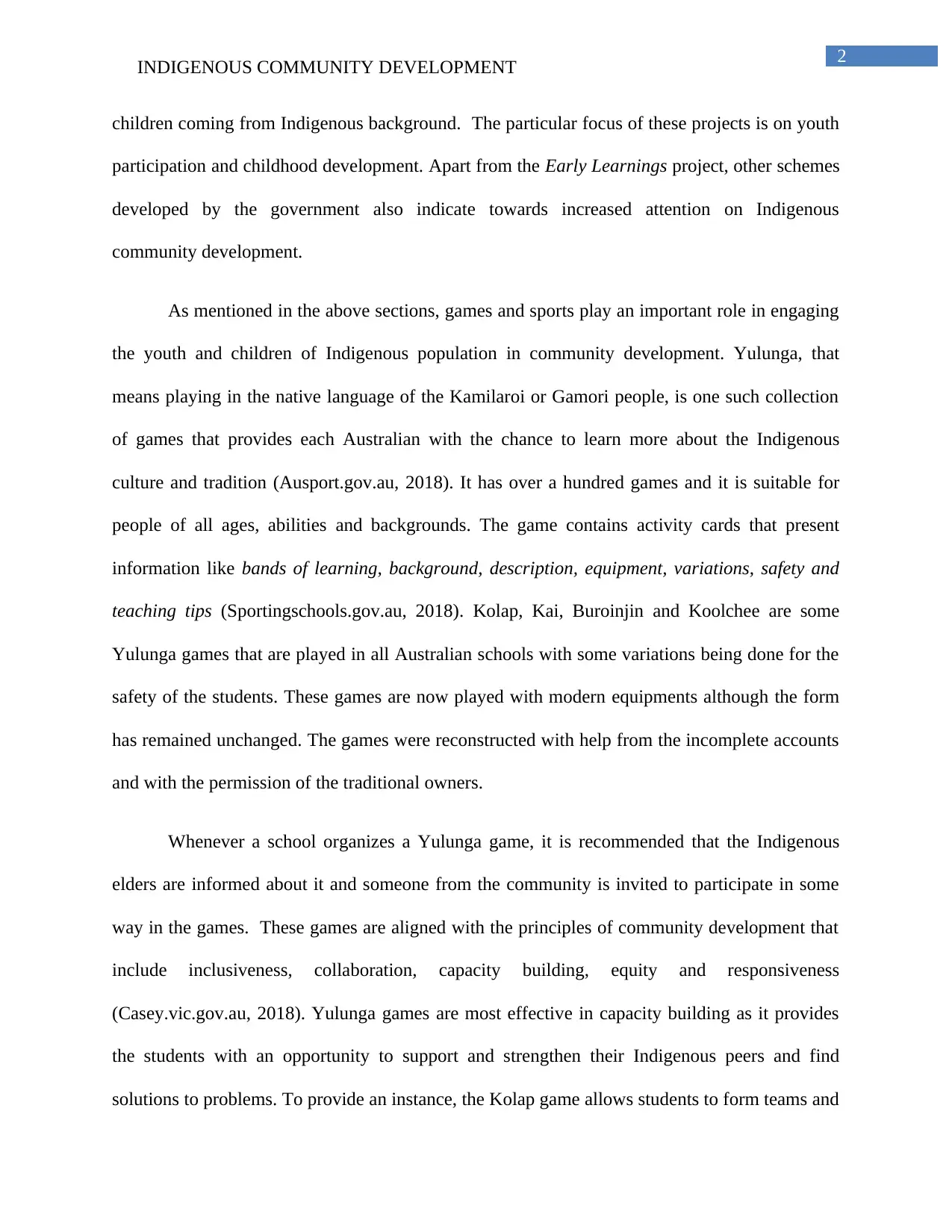
2
INDIGENOUS COMMUNITY DEVELOPMENT
children coming from Indigenous background. The particular focus of these projects is on youth
participation and childhood development. Apart from the Early Learnings project, other schemes
developed by the government also indicate towards increased attention on Indigenous
community development.
As mentioned in the above sections, games and sports play an important role in engaging
the youth and children of Indigenous population in community development. Yulunga, that
means playing in the native language of the Kamilaroi or Gamori people, is one such collection
of games that provides each Australian with the chance to learn more about the Indigenous
culture and tradition (Ausport.gov.au, 2018). It has over a hundred games and it is suitable for
people of all ages, abilities and backgrounds. The game contains activity cards that present
information like bands of learning, background, description, equipment, variations, safety and
teaching tips (Sportingschools.gov.au, 2018). Kolap, Kai, Buroinjin and Koolchee are some
Yulunga games that are played in all Australian schools with some variations being done for the
safety of the students. These games are now played with modern equipments although the form
has remained unchanged. The games were reconstructed with help from the incomplete accounts
and with the permission of the traditional owners.
Whenever a school organizes a Yulunga game, it is recommended that the Indigenous
elders are informed about it and someone from the community is invited to participate in some
way in the games. These games are aligned with the principles of community development that
include inclusiveness, collaboration, capacity building, equity and responsiveness
(Casey.vic.gov.au, 2018). Yulunga games are most effective in capacity building as it provides
the students with an opportunity to support and strengthen their Indigenous peers and find
solutions to problems. To provide an instance, the Kolap game allows students to form teams and
INDIGENOUS COMMUNITY DEVELOPMENT
children coming from Indigenous background. The particular focus of these projects is on youth
participation and childhood development. Apart from the Early Learnings project, other schemes
developed by the government also indicate towards increased attention on Indigenous
community development.
As mentioned in the above sections, games and sports play an important role in engaging
the youth and children of Indigenous population in community development. Yulunga, that
means playing in the native language of the Kamilaroi or Gamori people, is one such collection
of games that provides each Australian with the chance to learn more about the Indigenous
culture and tradition (Ausport.gov.au, 2018). It has over a hundred games and it is suitable for
people of all ages, abilities and backgrounds. The game contains activity cards that present
information like bands of learning, background, description, equipment, variations, safety and
teaching tips (Sportingschools.gov.au, 2018). Kolap, Kai, Buroinjin and Koolchee are some
Yulunga games that are played in all Australian schools with some variations being done for the
safety of the students. These games are now played with modern equipments although the form
has remained unchanged. The games were reconstructed with help from the incomplete accounts
and with the permission of the traditional owners.
Whenever a school organizes a Yulunga game, it is recommended that the Indigenous
elders are informed about it and someone from the community is invited to participate in some
way in the games. These games are aligned with the principles of community development that
include inclusiveness, collaboration, capacity building, equity and responsiveness
(Casey.vic.gov.au, 2018). Yulunga games are most effective in capacity building as it provides
the students with an opportunity to support and strengthen their Indigenous peers and find
solutions to problems. To provide an instance, the Kolap game allows students to form teams and
⊘ This is a preview!⊘
Do you want full access?
Subscribe today to unlock all pages.

Trusted by 1+ million students worldwide
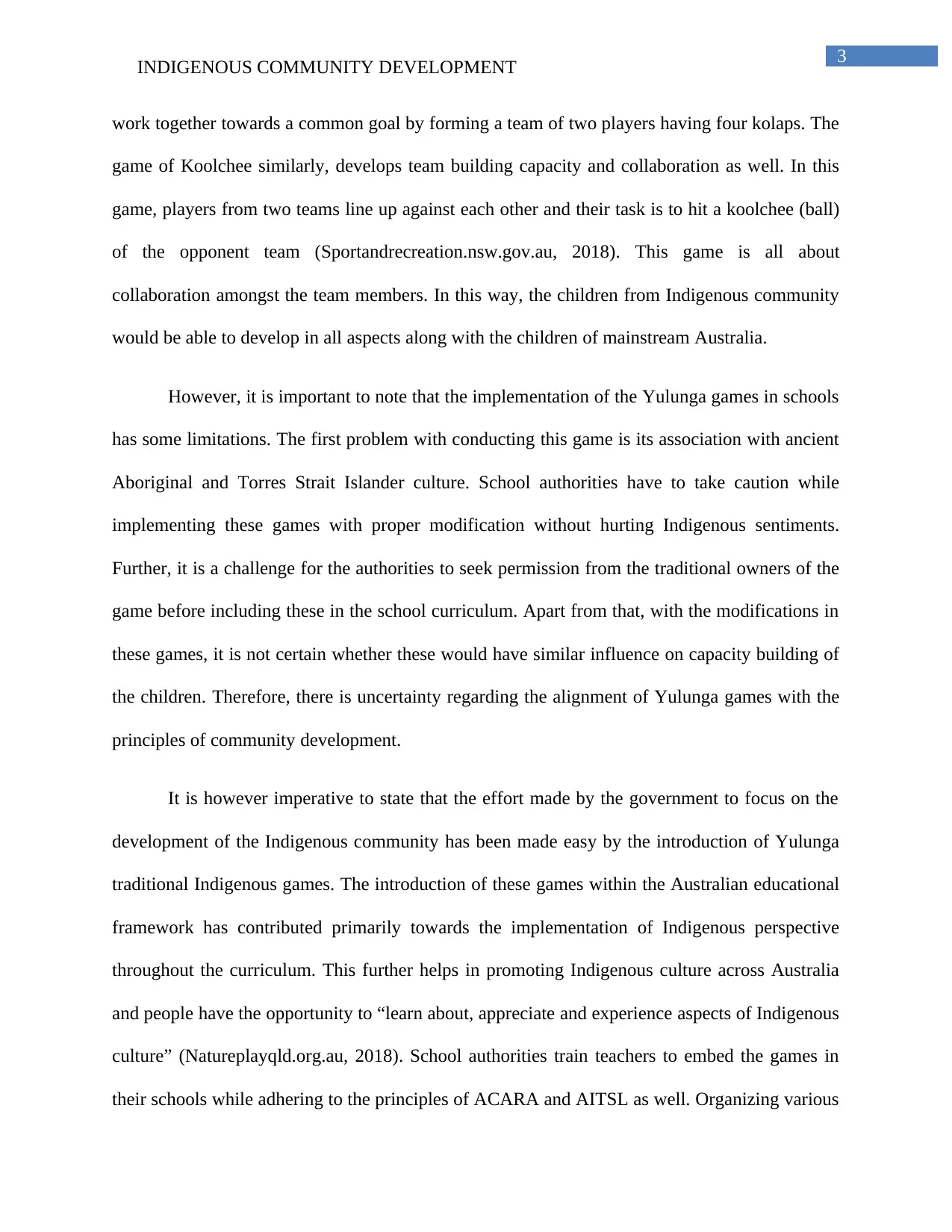
3
INDIGENOUS COMMUNITY DEVELOPMENT
work together towards a common goal by forming a team of two players having four kolaps. The
game of Koolchee similarly, develops team building capacity and collaboration as well. In this
game, players from two teams line up against each other and their task is to hit a koolchee (ball)
of the opponent team (Sportandrecreation.nsw.gov.au, 2018). This game is all about
collaboration amongst the team members. In this way, the children from Indigenous community
would be able to develop in all aspects along with the children of mainstream Australia.
However, it is important to note that the implementation of the Yulunga games in schools
has some limitations. The first problem with conducting this game is its association with ancient
Aboriginal and Torres Strait Islander culture. School authorities have to take caution while
implementing these games with proper modification without hurting Indigenous sentiments.
Further, it is a challenge for the authorities to seek permission from the traditional owners of the
game before including these in the school curriculum. Apart from that, with the modifications in
these games, it is not certain whether these would have similar influence on capacity building of
the children. Therefore, there is uncertainty regarding the alignment of Yulunga games with the
principles of community development.
It is however imperative to state that the effort made by the government to focus on the
development of the Indigenous community has been made easy by the introduction of Yulunga
traditional Indigenous games. The introduction of these games within the Australian educational
framework has contributed primarily towards the implementation of Indigenous perspective
throughout the curriculum. This further helps in promoting Indigenous culture across Australia
and people have the opportunity to “learn about, appreciate and experience aspects of Indigenous
culture” (Natureplayqld.org.au, 2018). School authorities train teachers to embed the games in
their schools while adhering to the principles of ACARA and AITSL as well. Organizing various
INDIGENOUS COMMUNITY DEVELOPMENT
work together towards a common goal by forming a team of two players having four kolaps. The
game of Koolchee similarly, develops team building capacity and collaboration as well. In this
game, players from two teams line up against each other and their task is to hit a koolchee (ball)
of the opponent team (Sportandrecreation.nsw.gov.au, 2018). This game is all about
collaboration amongst the team members. In this way, the children from Indigenous community
would be able to develop in all aspects along with the children of mainstream Australia.
However, it is important to note that the implementation of the Yulunga games in schools
has some limitations. The first problem with conducting this game is its association with ancient
Aboriginal and Torres Strait Islander culture. School authorities have to take caution while
implementing these games with proper modification without hurting Indigenous sentiments.
Further, it is a challenge for the authorities to seek permission from the traditional owners of the
game before including these in the school curriculum. Apart from that, with the modifications in
these games, it is not certain whether these would have similar influence on capacity building of
the children. Therefore, there is uncertainty regarding the alignment of Yulunga games with the
principles of community development.
It is however imperative to state that the effort made by the government to focus on the
development of the Indigenous community has been made easy by the introduction of Yulunga
traditional Indigenous games. The introduction of these games within the Australian educational
framework has contributed primarily towards the implementation of Indigenous perspective
throughout the curriculum. This further helps in promoting Indigenous culture across Australia
and people have the opportunity to “learn about, appreciate and experience aspects of Indigenous
culture” (Natureplayqld.org.au, 2018). School authorities train teachers to embed the games in
their schools while adhering to the principles of ACARA and AITSL as well. Organizing various
Paraphrase This Document
Need a fresh take? Get an instant paraphrase of this document with our AI Paraphraser
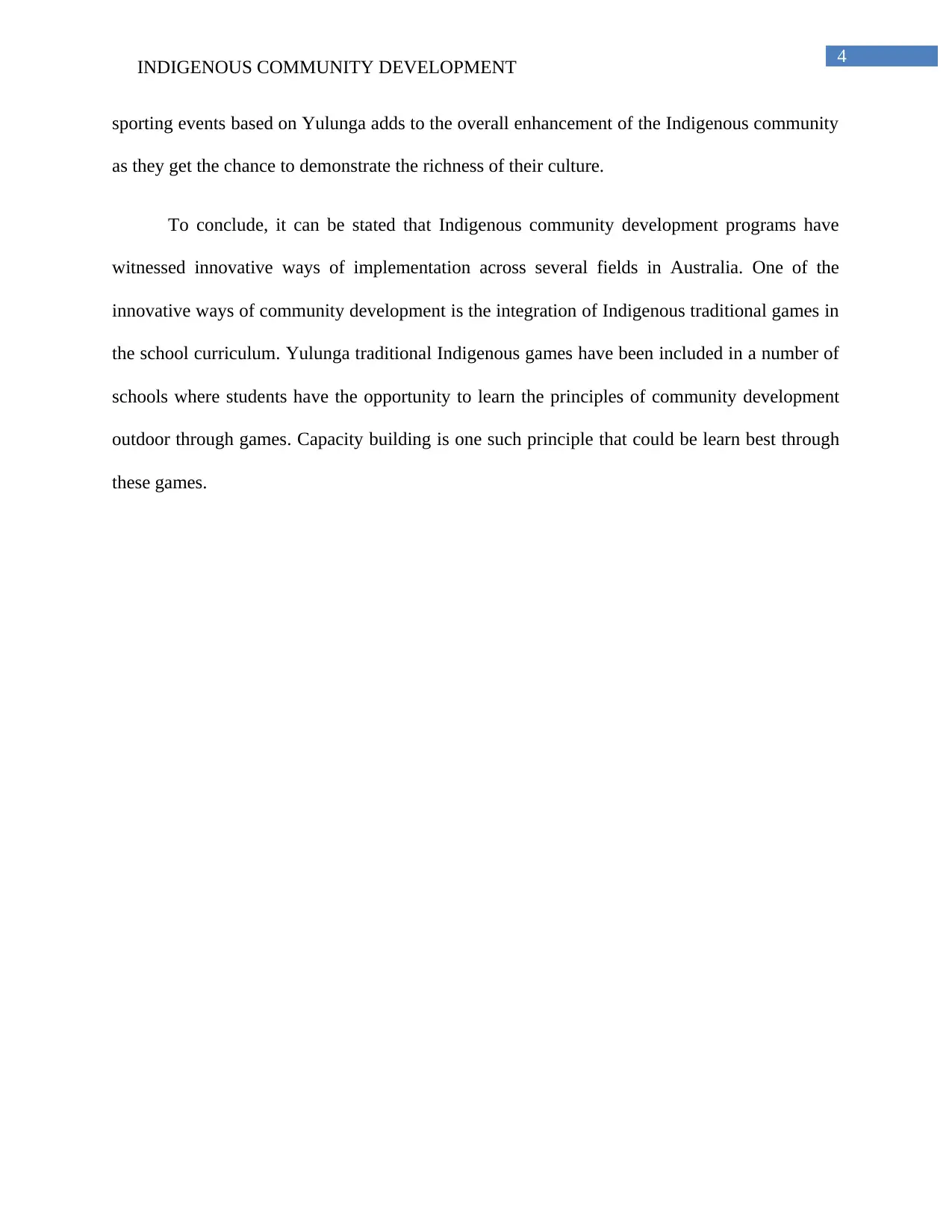
4
INDIGENOUS COMMUNITY DEVELOPMENT
sporting events based on Yulunga adds to the overall enhancement of the Indigenous community
as they get the chance to demonstrate the richness of their culture.
To conclude, it can be stated that Indigenous community development programs have
witnessed innovative ways of implementation across several fields in Australia. One of the
innovative ways of community development is the integration of Indigenous traditional games in
the school curriculum. Yulunga traditional Indigenous games have been included in a number of
schools where students have the opportunity to learn the principles of community development
outdoor through games. Capacity building is one such principle that could be learn best through
these games.
INDIGENOUS COMMUNITY DEVELOPMENT
sporting events based on Yulunga adds to the overall enhancement of the Indigenous community
as they get the chance to demonstrate the richness of their culture.
To conclude, it can be stated that Indigenous community development programs have
witnessed innovative ways of implementation across several fields in Australia. One of the
innovative ways of community development is the integration of Indigenous traditional games in
the school curriculum. Yulunga traditional Indigenous games have been included in a number of
schools where students have the opportunity to learn the principles of community development
outdoor through games. Capacity building is one such principle that could be learn best through
these games.
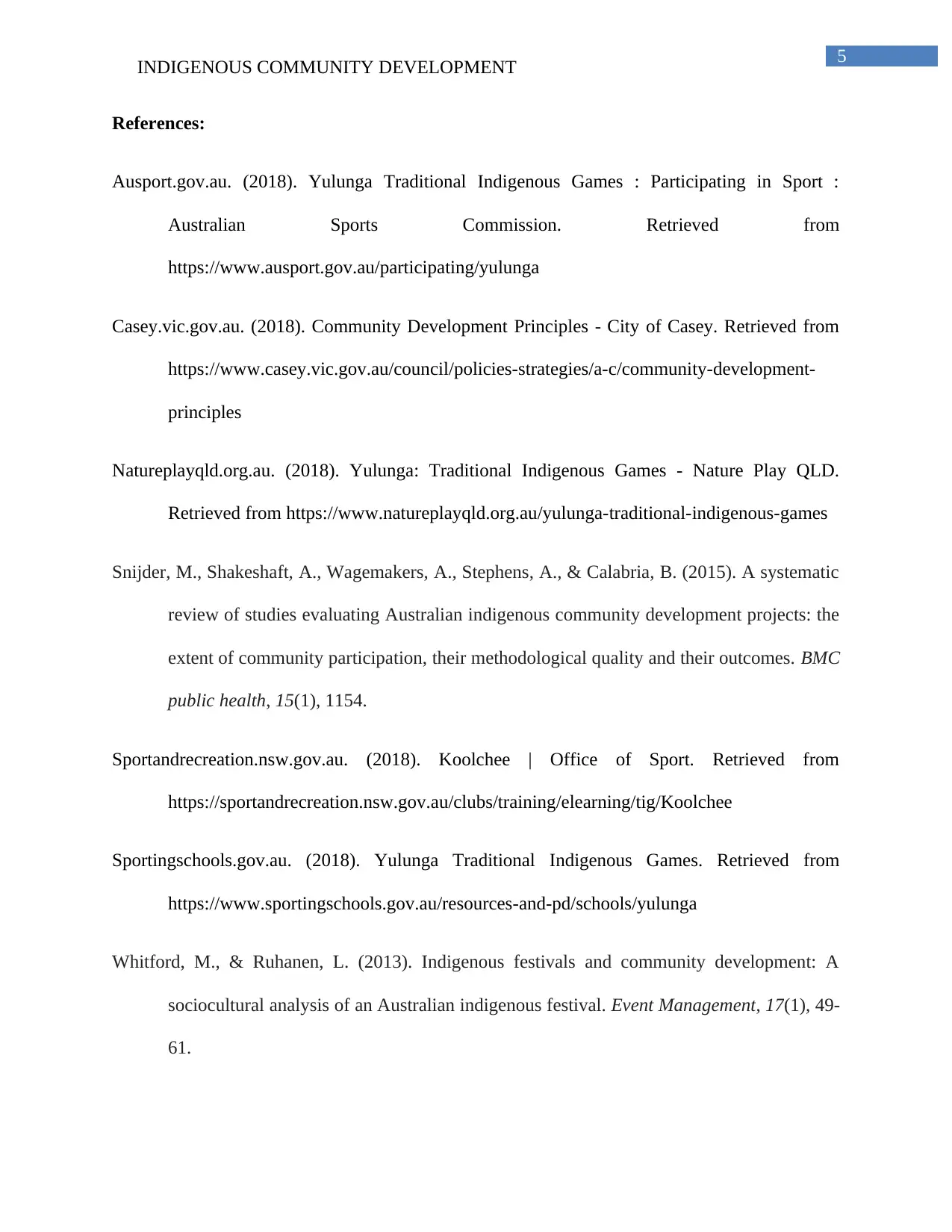
5
INDIGENOUS COMMUNITY DEVELOPMENT
References:
Ausport.gov.au. (2018). Yulunga Traditional Indigenous Games : Participating in Sport :
Australian Sports Commission. Retrieved from
https://www.ausport.gov.au/participating/yulunga
Casey.vic.gov.au. (2018). Community Development Principles - City of Casey. Retrieved from
https://www.casey.vic.gov.au/council/policies-strategies/a-c/community-development-
principles
Natureplayqld.org.au. (2018). Yulunga: Traditional Indigenous Games - Nature Play QLD.
Retrieved from https://www.natureplayqld.org.au/yulunga-traditional-indigenous-games
Snijder, M., Shakeshaft, A., Wagemakers, A., Stephens, A., & Calabria, B. (2015). A systematic
review of studies evaluating Australian indigenous community development projects: the
extent of community participation, their methodological quality and their outcomes. BMC
public health, 15(1), 1154.
Sportandrecreation.nsw.gov.au. (2018). Koolchee | Office of Sport. Retrieved from
https://sportandrecreation.nsw.gov.au/clubs/training/elearning/tig/Koolchee
Sportingschools.gov.au. (2018). Yulunga Traditional Indigenous Games. Retrieved from
https://www.sportingschools.gov.au/resources-and-pd/schools/yulunga
Whitford, M., & Ruhanen, L. (2013). Indigenous festivals and community development: A
sociocultural analysis of an Australian indigenous festival. Event Management, 17(1), 49-
61.
INDIGENOUS COMMUNITY DEVELOPMENT
References:
Ausport.gov.au. (2018). Yulunga Traditional Indigenous Games : Participating in Sport :
Australian Sports Commission. Retrieved from
https://www.ausport.gov.au/participating/yulunga
Casey.vic.gov.au. (2018). Community Development Principles - City of Casey. Retrieved from
https://www.casey.vic.gov.au/council/policies-strategies/a-c/community-development-
principles
Natureplayqld.org.au. (2018). Yulunga: Traditional Indigenous Games - Nature Play QLD.
Retrieved from https://www.natureplayqld.org.au/yulunga-traditional-indigenous-games
Snijder, M., Shakeshaft, A., Wagemakers, A., Stephens, A., & Calabria, B. (2015). A systematic
review of studies evaluating Australian indigenous community development projects: the
extent of community participation, their methodological quality and their outcomes. BMC
public health, 15(1), 1154.
Sportandrecreation.nsw.gov.au. (2018). Koolchee | Office of Sport. Retrieved from
https://sportandrecreation.nsw.gov.au/clubs/training/elearning/tig/Koolchee
Sportingschools.gov.au. (2018). Yulunga Traditional Indigenous Games. Retrieved from
https://www.sportingschools.gov.au/resources-and-pd/schools/yulunga
Whitford, M., & Ruhanen, L. (2013). Indigenous festivals and community development: A
sociocultural analysis of an Australian indigenous festival. Event Management, 17(1), 49-
61.
⊘ This is a preview!⊘
Do you want full access?
Subscribe today to unlock all pages.

Trusted by 1+ million students worldwide
1 out of 6
Related Documents
Your All-in-One AI-Powered Toolkit for Academic Success.
+13062052269
info@desklib.com
Available 24*7 on WhatsApp / Email
![[object Object]](/_next/static/media/star-bottom.7253800d.svg)
Unlock your academic potential
Copyright © 2020–2026 A2Z Services. All Rights Reserved. Developed and managed by ZUCOL.





